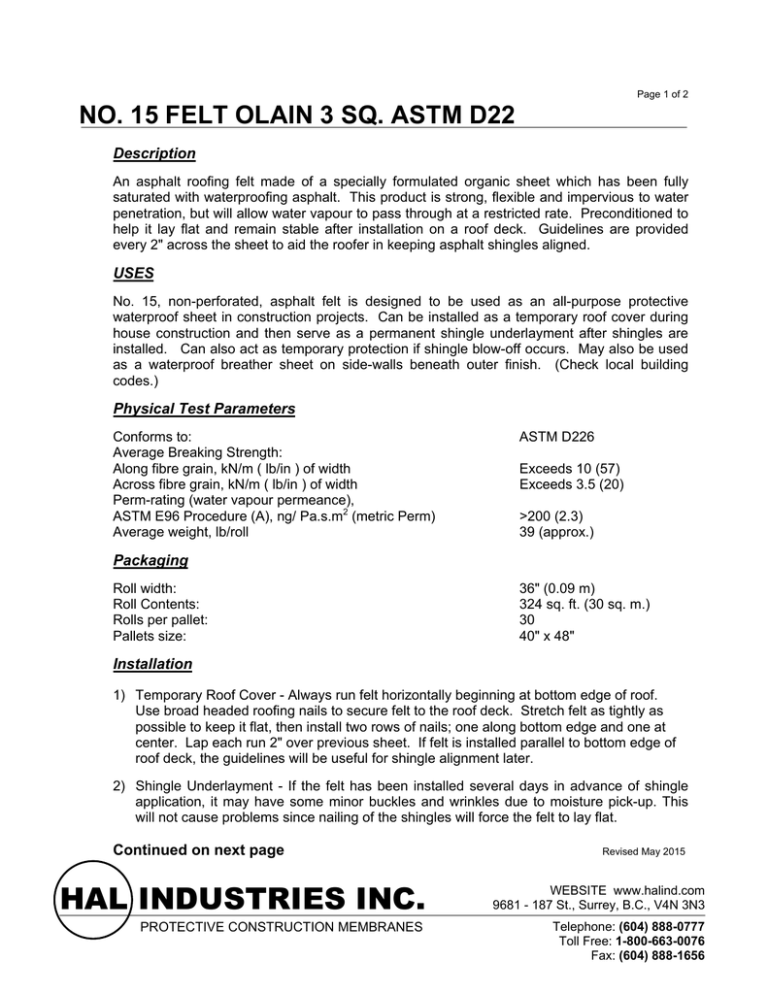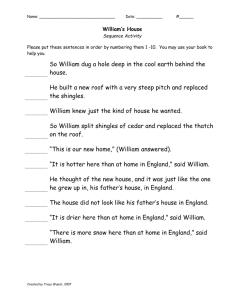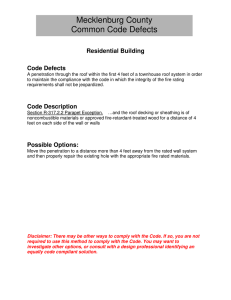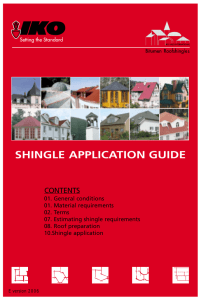Specification Sheet - HAL Industries Inc.
advertisement

Page 1 of 2 NO. 15 FELT OLAIN 3 SQ. ASTM D22 Description An asphalt roofing felt made of a specially formulated organic sheet which has been fully saturated with waterproofing asphalt. This product is strong, flexible and impervious to water penetration, but will allow water vapour to pass through at a restricted rate. Preconditioned to help it lay flat and remain stable after installation on a roof deck. Guidelines are provided every 2" across the sheet to aid the roofer in keeping asphalt shingles aligned. USES No. 15, non-perforated, asphalt felt is designed to be used as an all-purpose protective waterproof sheet in construction projects. Can be installed as a temporary roof cover during house construction and then serve as a permanent shingle underlayment after shingles are installed. Can also act as temporary protection if shingle blow-off occurs. May also be used as a waterproof breather sheet on side-walls beneath outer finish. (Check local building codes.) Physical Test Parameters Conforms to: Average Breaking Strength: Along fibre grain, kN/m ( lb/in ) of width Across fibre grain, kN/m ( lb/in ) of width Perm-rating (water vapour permeance), ASTM E96 Procedure (A), ng/ Pa.s.m2 (metric Perm) Average weight, lb/roll ASTM D226 Exceeds 10 (57) Exceeds 3.5 (20) >200 (2.3) 39 (approx.) Packaging Roll width: Roll Contents: Rolls per pallet: Pallets size: 36" (0.09 m) 324 sq. ft. (30 sq. m.) 30 40" x 48" Installation 1) Temporary Roof Cover - Always run felt horizontally beginning at bottom edge of roof. Use broad headed roofing nails to secure felt to the roof deck. Stretch felt as tightly as possible to keep it flat, then install two rows of nails; one along bottom edge and one at center. Lap each run 2" over previous sheet. If felt is installed parallel to bottom edge of roof deck, the guidelines will be useful for shingle alignment later. 2) Shingle Underlayment - If the felt has been installed several days in advance of shingle application, it may have some minor buckles and wrinkles due to moisture pick-up. This will not cause problems since nailing of the shingles will force the felt to lay flat. Continued on next page HAL INDUSTRIES INC. PROTECTIVE CONSTRUCTION MEMBRANES Revised May 2015 WEBSITE www.halind.com 9681 - 187 St., Surrey, B.C., V4N 3N3 Telephone: (604) 888-0777 Toll Free: 1-800-663-0076 Fax: (604) 888-1656 Page 2 of 2 NO. 15 FELT PLAIN 3 SQ. ASTM D226 Cont’d Deck Preparation 1) Always ensure that the deck lumber is nailed tightly and all rotted or broken boards have been replaced. 2) If new plywood or O.S.B. sheathing is being installed on the roof deck be aware that expansion of these sheets may take place within 3 to 4 months of completion. This expansion is caused by vapour pick-up from the attic, and is more severe in homes with poor ceiling vapour barriers and insufficient attic ventilation. The expansion of new roof sheathing can sometimes cause bulges and ridges to develop in the shingles. O.S.B. manufacturers state that a 1/8" gap must be left between sheet edges for expansion. To help prevent excessive deck expansion consider the following suggestions: A) If possible, pre-condition the sheathing by storing separated for several weeks in a humid environment prior to use. B) When used immediately after purchase, the sheets should be cut in half prior to installation to reduce the amount of expansion per segment. C) Attic ventilation should be checked and increased if not sufficient. Installing ridge vents is very beneficial. D) Openings from the living space to the attic must be eliminated and exhaust fans must not discharge into the attic. E) All sheathing must be nailed very securely to each supporting member with proper fasteners. If nailing over old decking, or strapping, be sure that nails are long enough to penetrate well into joists or rafters, and not simply into old deck boards. Always stagger the sheets so that joints don't coincide. CAUTION Great care must be exercised in all phases of steep slope roof application. Follow the safety guidelines of the safety authority having jurisdiction in your area. The information provided herein, while not guaranteed, is to the best of our knowledge true and accurate. Except when agreed to in writing for specific conditions of use, no warranty or guarantee expressed or implied is made regarding the performance of any products, since the manner of use and handling are beyond our control. The user of such information assumes all risk connected with the use thereof. Nothing contained herein is to be construed as permission or as a recommendation to infringe any patent. Revised May 14, 2015 FE0700.doc


